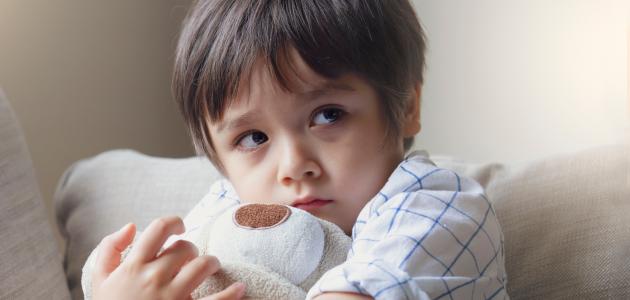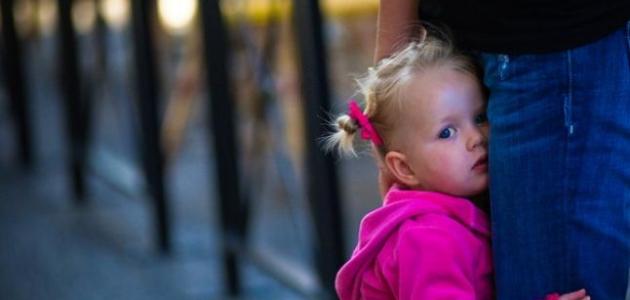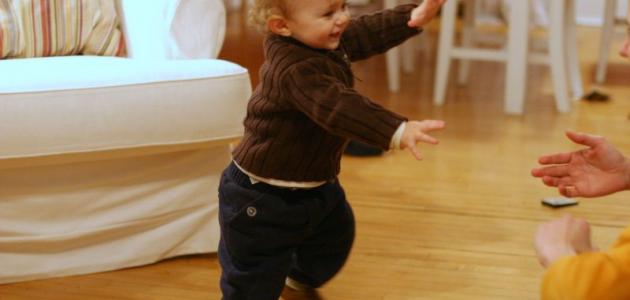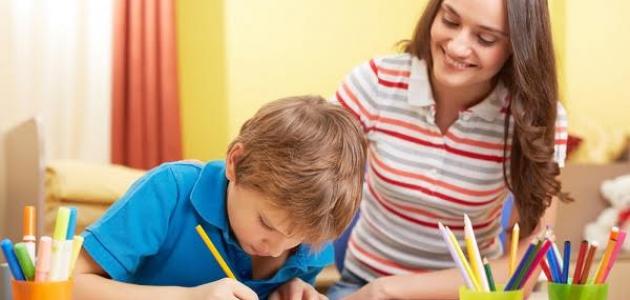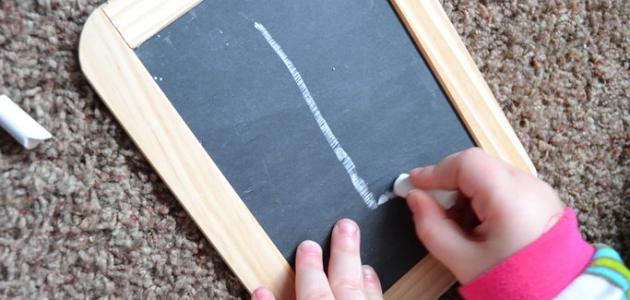Fear in children
The child is exposed to many natural fears, and the nature of these fears often differs according to the age of the child, and fear begins to appear in the child from the beginning of his life, as many children fear entering dark rooms and places, and the child often insists on turning on the lights, and many Babies are afraid of thunder, or strange sounds in general. These and other fears disappear when the child grows up, and parents can help their children overcome these fears and get rid of them, and the matter requires wisdom, patience, and understanding on the part of the parents, and at the same time, the parents must understand some of the actual risks that threaten their children.
Children's fear of different ages
Children have many natural fears, and these fears differ according to the age of the child, and in proportion to the extent of his awareness of things, and the following are the most important fears that appear on children in different age groups:
- Fears that affect children aged two years and underMany children at this age are afraid of hearing loud voices and strange sounds for the child, as well as fear of separation from parents, fear of strangers, and seeing large objects and creatures.
- Fears of a pre-school child (Between the ages of three to six years): At this stage, the child is exposed to fear of seeing imaginary things, such as: monsters, ghosts that he sees on TV, supernatural beings, and masks, as well as fear of the dark, sleeping alone, and if he hears a strange sound, especially during the night. Like the sound of thunder, he might feel fear.
- Fears of school-age children (Between seven and sixteen years): At this age, the child’s fear of realistic things begins, such as: his fear of being injured or injured, as well as fear of the doctor, the angry teacher, fear of school achievement, death, and natural accidents: such as earthquakes floods, and others.
An important point should be noted, which is children's fear of going to school; This is due to their attachment to parents, and their unwillingness to separate from them, and this problem is common in children between the ages of five to seven years, and this does not apply to older children; Because they are somewhat more aware, and other reasons for a child to fear school are the bad and harsh treatment he finds there, and the presence of teachers or even unfriendly colleagues.
Read also:Methods of teaching Arabic letters to childrenCauses and causes of fear in children
There are many reasons for fear in children, including:
- The child is exposed to things and situations that he cannot explain, so the child feels threatened by these things, and we may find a child who is not afraid of things that frighten his other brother or sister.
- What the child sees from the reactions of others towards something, where the child feels fear when he sees the reaction of the adult person facing him with something, or even another child, when he sees a snake or a lion, for example.
- When a child sees a frightening and painful event, such as a child witnessing a frightening traffic accident, or a cat being run over by a car, it is natural for the child to feel fear, as this type of accident remains stuck in the child’s mind until he grows up.
- Lack of respect for the child and the lack of his personality, as many of the behaviors that come out of the parents or family members may destroy the child’s personality, reduce his respect, and even make him not respect himself, and lose confidence in them, so the parents and family members must support the child, enhance his self-confidence, and make him feel the value of himself , so that the child avoids fear.
- Permanent family problems, permanent family problems expose children to stress, and make them vulnerable to fear, and this is an important problem that the family must address and avoid in order to preserve their children.
- The anxiety that the child suffers from is due to the level of his fear of past events, and the capacity of his imagination, as there are many children who are characterized by a wild imagination that they are afraid of.
Tips for parents
Dealing with the problem of fear in a child is very important, and the age of the child must be taken into account, and the extent of his awareness of what is going on around him, and among the most important tips are the following:
Read also:How do I make my child strong personality- Dealing with the problem wisely, respecting the child's sense of fear, and avoiding mocking him or his feelings or the source of his fear, and this must be taken seriously.
- Not trying to spare the child from exposure to the source of his fear, as complete avoidance of the sources of fear is not the best solution to the problem, and at the same time the child should not be forced to bear what he cannot bear because of fear, but rather he must face his fear gradually.
- Parents must accept their child's fear and understand it logically. And provide full support to the child, and work to reassure him and raise his spirits.
- One of the parents should speak to the child with confidence and calmness. The manner of speaking and talking with the child about the problem of his fear is very important, and allowing the child to talk about his fear helps him overcome it.
- Some fears are good for the child. When parents warn their child not to accompany strangers - for example - this child will know when he gets a little older about the truth of this matter, and his awareness about this fact will increase. Because some people are really bad. The older the child grows, the more he understands about fact and fiction, and the cause and effect of things around him, and eventually the child will overcome most of his fears, or they will disappear on their own.
The way to face fears
Confronting a child with his fears is very important, and it is the best way to overcome them. Parents must teach their child how to face his fears, by providing him with skills that make him feel that he is able to control his fears. Among these skills are the following:
Read also:Methods of working and teaching aids for children- Teaching the child in different ways the extent of the degree of fear they have, such as using a scale from 1-10, where number one is for the least fearful situations, and number 10 is for the most fearful situations, and every time the child is exposed to the source of fear, his feeling of fear will gradually decrease if he evaluates the degree of fear time after time.
- Teaching the child to encourage himself when exposed to sources of fear, such as using motivational and positive sentences, such as: “I can do that!”, or “Things will be fine,” and others.
- Teaching the child different relaxation mechanisms and methods, such as taking a deep breath, or imagining himself floating on a cloud, or lying on the seashore, and teaching him how to turn a scary monster into a funny monster, and so on.
When are children treated for fear?
When parents feel that their child is not himself, and that his fear negatively affects his life, and his practice of his usual activity, such as going to school, playing with the rest of the children, or preventing him from sleeping, or when the child is exposed to great stress resulting from fear, and in this case, the child must be taken To a child psychiatrist.
How is fear treated in children?
The method by which fear is treated in adults is often used to treat children, and among these methods are the following:
- Gradually exposing the child to the situations he is afraid of, and it is important to reveal the child's old record, and to know what he was afraid of before starting treatment.
- Not punishing the child for his fear may increase his fears. Rather, it may lead him to suppress his feelings, and this leads to dangerous consequences for the child, so the parents should avoid this bad method and replace it with supporting the child, and develop his ability to face fear.
- Practicing stimulating activities with a frightened child, for example: for parents and their child to play with the things that he is afraid of, so the monster is in the form of a game, because children are more responsive when playing.
- When the child is very afraid, then the one who treats the child uses relaxation methods, as well as shows video clips that encourage him to confront his fear in an imaginary way.
